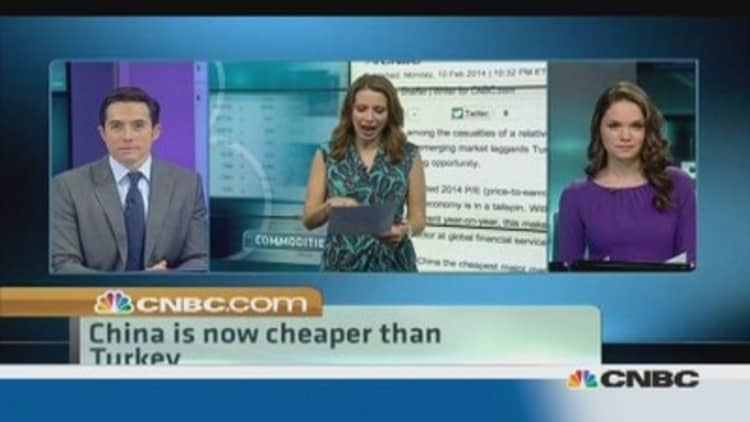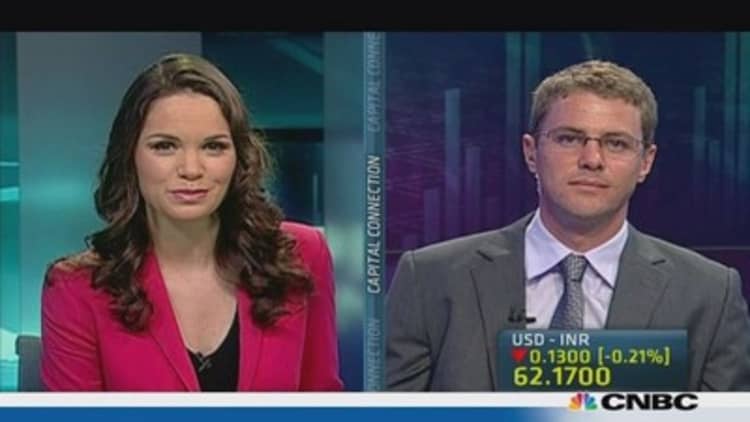
China was among the casualties of the recent relatively indiscriminate selloff in emerging markets, leaving its shares cheaper than laggards Turkey and Argentina and potentially opening a bargain buying opportunity.
"With an estimated 2014 P/E (price-to-earnings ratio) of 8.1, China is cheaper than Turkey, whose economy is in a tailspin. With China's industrial profits growing at a robust 12.2 percent year-on-year, this makes no sense to us," David Goldman, managing director at global financial services group Reorient, said in a note.
"That makes China the cheapest major market in the world on a forward-looking P/E basis (and the cheapest it's ever been)," he said.
(Read more: Rout overdone, emerging markets to 'turn' this year)
China shares have been trading like an emerging market index, he noted. "That can't be right. A great deal of the emerging market index reflects commodity exporters who have suffered in the deflationary headwinds, while China benefits from lower raw materials prices."
Indeed, some are predicting a big jump in China equities. JPMorgan expects a 15-20 percent rebound, to an implied 10 times earnings, in coming weeks as focus shifts to two key political meetings which should kickstart the country's reform agenda.
Others have also noted a disconnect between China shares' performance and its relatively stable economy.
"It appears that the market believes that China's economic situation has deteriorated by as much as those in Argentina and Turkey in recent weeks," Jun Ma, chief economist at Deutsche Bank, said in a report. "This market perception of China is wrong."
(Read more: Are markets headed for a perfect storm?)
He noted the China H-share index has fallen by 16 percent since the beginning of December, nearly as much as Turkey's 22 percent fall in U.S. dollar terms and Argentina's near 20 percent decline and topping Brazil's 12.7 percent fall.
But those countries' declines were triggered by factors that don't apply to China, he said, with their currencies depreciating sharply amid concerns of fund outflows as the U.S. Federal Reserve began to taper its asset purchases. In addition, other emerging markets face concerns such as high inflation, fears of external debt crises and political instability, he noted.
"We strongly believe that China's economic fundamentals are much healthier than most other emerging markets and China is one of the least vulnerable emerging market economies to U.S. tapering," Ma said.
China's yuan has been among the most stable emerging market currencies in the past few weeks and it's likely to remain stable this year, he said, noting that in the period from December 1 to February 5, the yuan gained 0.5 percent against the U.S. dollar while Argentina's peso fell 22 percent and Turkey's lira shed 8.6 percent.
(Read more: Why you don't need to cry over Argentina)

"The renminbi should remain one of the most resilient to external shocks in 2014, given that its capital account is still largely controlled for portfolio flows, and macro fundamentals are very supportive of its currency," Ma said, adding Deutsche Bank still expects it to appreciate by about 2 percent against the U.S. dollar this year.
To be sure, China's economic data have shown some deterioration recently and there are concerns about bad debt in its banking system.
"Private sector credit in China has grown more rapidly than you should be comfortable with in an emerging market normally," Daniel Martin, an economist at Capital Economics, told CNBC.
"One thing that's certain is it can't carry on having credit growth the way that it has been. Credit growth has to slow that means the economy has to slow," he added.
(Read more: Is copper's swoon a bad omen for China?)
Recent data show the economy is indeed slowing. China's gross domestic product (GDP) expanded at a rate of 7.7 percent last year, its slowest rate since 1999. In addition, the official manufacturing purchasing managers' index fell to 50.5 in January from 51.0 in December.
But even so, it's not clear this should overly concern investors.
"This is a process that has to happen and it means China's economy will be more sustainable in the long term. These moves, even though they slow the economy, they make it safer," Martin said. "The panic over some bad data that came out of China in January is probably well overdone," he said. "We feel like China can at least avoid the hard landing scenario."
—By CNBC.Com's Leslie Shaffer; Follow her on Twitter @LeslieShaffer1

